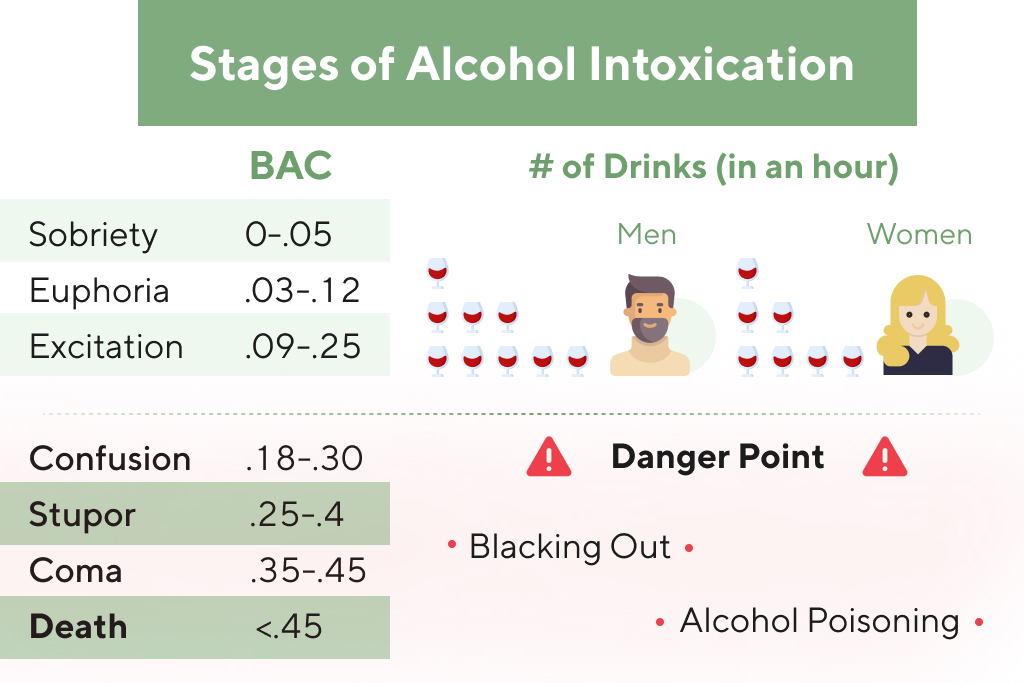Many benefit from a combination of detoxification, behavioral therapy, medication, and peer support. Seeking professional guidance helps create a personalized recovery plan that increases the likelihood of lasting success. Alcohol misuse harms nearly every system in the body, leading to both short-term and long-term health complications. While moderate drinking may not cause immediate harm, excessive or chronic alcohol use increases the risk of severe medical conditions affecting physical, mental, and cognitive well-being. Recognizing these dangers is crucial for prevention and intervention. A number of health conditions Sober living house can often go hand in hand with AUD.
- If someone loses control over their drinking and has an excessive desire to drink, it’s known as dependent drinking (alcoholism).
- After the individual receives personalized feedback, the counselor will help set goals.
- More than 178,000 Americans die each year as a result, and drinking alcohol is a factor in more than half of all murders, suicides, and traffic accidents in the U.S.
- Many use alcohol to cope with stress or emotional pain, leading to dependency.
What is considered 1 drink?
If you have it, you regularly drink heavy amounts of alcohol despite its negative effect on your life, health, and the people around you. With treatment, about 70% of people with alcoholism are able to decrease the number of days they consume alcohol and improve their overall health status within six months. On the other hand, most individuals who have been treated for a moderate to severe alcohol-use disorder have relapsed at least once during the first year after treatment. Those individuals seem to drink less often and lower amounts after receiving treatment compared with before treatment. Both men and women are more likely to develop alcoholism if they have a childhood history of being physically or sexually abused.
Short term
But these may be easier for concerned family members and friends to ask, since they may hesitate to ask direct questions about quantity. NIAAA supports and conducts research on the impact of alcohol use on human health and well-being. Alcohol use disorder can range from mild to severe, depending on the symptoms and impact. If you have any of these symptoms, your drinking may already be a cause for concern.
Babies cannot be born with addiction because addiction is a behavioral disorder—they are simply born manifesting a withdrawal syndrome. Use clinically accurate, non-stigmatizing language the same way you would for other medical conditions. The National Institute on Alcohol Abuse and Alcoholism (NIAAA), a component of the National Institutes of Health, is the lead federal agency for research on alcohol.

Alcohol use disorder
- A .gov website belongs to an official government organization in the United States.
- For more information about alcohol and cancer, please visit the National Cancer Institute’s webpage “Alcohol and Cancer Risk” (last accessed June 6, 2024).
- As well as the NHS, there are a number of charities and support groups across the UK that provide support and advice for people with an alcohol misuse problem.
- Heavy drinking can seriously damage the liver, stomach, heart, brain, and nervous system.
Chronic alcohol use can reduce the body’s ability to fight off diseases. Preventing alcohol misuse requires education, open communication, and access to supportive resources. Seeking help is a sign of strength, and with the right treatment, recovery is possible. Encouraging awareness and intervention can reduce harm and improve overall well-being.
Alcohol Use Disorder Causes
Other medications can help you quit drinking by suppressing alcohol cravings or making you feel sick when alcohol enters your body. If you have a history of withdrawal symptoms, see a health professional before quitting. You should also see a professional before quitting alcohol if you have other health conditions. For example, any alcohol consumption by a pregnant person can be considered alcohol misuse, as well as drinking under the legal age of 21. Drinking alcohol too much or too often, or being unable to control alcohol consumption, can be a sign of alcohol misuse and, in some cases, alcohol use disorder (AUD). Your provider may also be able to suggest an online self-guided program.
What are the complications of alcohol use disorder?
Both the volume of lifetime alcohol use and a combination of context, frequency of alcohol consumption and amount consumed per occasion increase the risk of the wide range of health and social harms. The https://ecosoberhouse.com/ risks increase largely in a dose-dependent manner with the volume of alcohol consumed and with frequency of drinking, and exponentially with the amount consumed on a single occasion. Surrogate and illegally produced alcohols can bring an extra health risk from toxic contaminants. Treatment for alcoholism also addresses the medical and psychological consequences of alcohol addiction.
Person with alcohol use disorder vs. alcoholic

Keep reading to learn more about AUD, including who is at risk, common symptoms, treatment, and more. It can be hard to see there is a problem even if the drinking is negatively impacting your health and your life. If you have a concern that you have AUD, you can see a health professional for consultation. They may ask you about your drinking habits and health history. Research shows a high correlation between alcohol misuse and high-risk sexual behavior, violence, crime, self-injury, and fatal injury from things like motor vehicle accidents. People with AUD represent about 20–35 percent of completed suicides.
Can alcohol abuse be prevented or avoided?

And 6 p.m., immediately after school, and prior to parents’ arrival at home from work. Teen participation in extracurricular activities has therefore been revealed to be an important prevention measure for the use of alcohol in this age group. Parents can also help educate teens about appropriate coping and stress-management strategies. For example, 15- to 16-year-olds who use religion to cope with stress tend to use drugs significantly less often and have fewer problems as a result of drinking than their peers who do not use religion to cope.
Alcoholism
Check with your doctor about the safest way to cut back if you’re used to regularly drinking large amounts of alcohol. After detoxification, many people with alcohol disorders need some form of long-term support or counseling to remain sober. Recovery programs focus on teaching a person with alcoholism about the disease, its risks, and ways to cope with life’s usual stresses without turning to alcohol. Psychotherapy may help a person understand the influences that trigger drinking. Many patients benefit from self-help groups such as Alcoholics Anonymous (AA), Rational Recovery or SMART (Self Management and Recovery Training). Necessarily, public and internalized stigma surrounding alcoholism can have widespread effects.
Once a drinker wants to stop, treatment can take place in an outpatient setting (such as regular appointments with a counselor) or in a hospital inpatient program (where the treatment is much more intensive). Support groups like Alcoholics Anonymous (AA) and SMART Recovery provide peer encouragement and accountability. AA follows a 12-step program focusing on personal growth and community support, while SMART Recovery uses a science-based, self-empowerment approach. Participation in support groups has been shown to reduce relapse rates and strengthen long-term sobriety. Drinking too much – on a single occasion or over time – can take a serious toll on your health. The whole body is affected by alcohol use–not just the liver, but also the brain, gut, pancreas, lungs, cardiovascular system, immune system, and more.
Use person with an opioid use disorder (abbreviated to OUD) or person with opioid addiction instead of addict, user, junkie, or drug abuser. NAS refers to a baby experiencing withdrawal symptoms from in-utero exposure to substances like cocaine, psychiatric medications, or those substances and opioids. To prevent excessive alcohol use and long term alcohol misuse may cause its impact in states and communities through public health surveillance, partnerships, and applied research for translation into public health practice. After drinking, you’ll become less responsible, less agreeable, and less able to think clearly. You’re also more likely to experience negative consequences, such as being arrested, when you drink alcohol.

